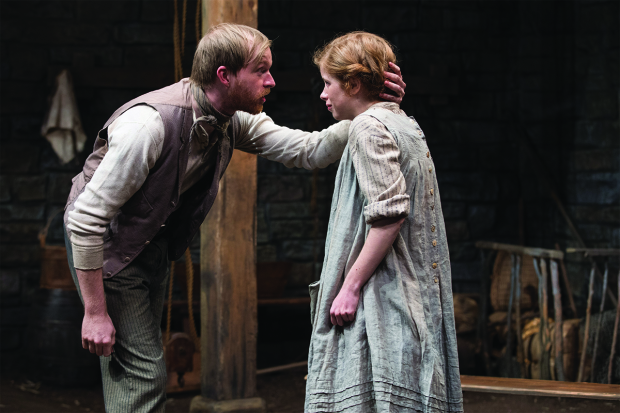Language and History Collide in Translations

(© Teresa Wood)
Brian Friel was — and remains — one of Ireland's most beloved dramatists. His plays are cherished not only for their intriguing plots, but for the richness of their language. His 1980 play Translations, about the spoken word in rural Northern Ireland in the 19th century, also delves into the political relationship between England and Ireland and the desire of immigrating to America versus remaining in bucolic County Donegal. Studio Theatre's current production of the play is a beautiful example of how Translations should be produced. It is a lush feast for the ear and eye.
Translations takes place in 1933 and recollects a period in history when the British government sent its army engineers to Northern Ireland to remake the maps, giving new English names to the old Gaelic ones. To the Irish, the process of standardization didn't merely wipe out the lyrical and descriptive names, but also altered the history of that land since it was first named. The play is set in an old barn at a typical hedge school where people learned Latin, Greek, English, and arithmetic before a formal system of education was developed. An assistant teacher, Manus (Matthew Aldwin McGee), teaches a painfully shy girl (Megan Graves) how to say, "My name is Sarah."
A scruffy, ancient pupil named Jimmy Jack (Martin Giles) enters, collapses on a mattress, and reads a Latin text aloud. A young woman, Bridget (Caroline Dubberly), and a lively young woman, Maire (Molly Carden), along with a boisterous young man, Doalty (Joe Mallon), join the scene. The talk turns to the fact that a national school will be built nearby soon. Unlike the hedge school, the new school will teach only English. Manus's father, Hugh (Brad Armacost), the school's headmaster, enters and the class begins in earnest as he energetically drills the students on the derivations of words, throws multiplication problems at them, and chastens them if they don't answer fast enough.
Meanwhile, Hugh's his younger son, Owen (Erin Gann), returns home after being in Dublin for six years. He brings with him two of the soldiers who have come to remake the maps, Captain Lancey (Jeff Keogh) and Lieutenant Yolland (Cary Donaldson). Owen is working as a Gaelic-to-English translator for the British officers. While things start off okay between all parties, by the end of the play, Yolland has disappeared and Lancey is threatening dire consequences to the villagers and their livestock if his assistant is not found.
The cast is a well-balanced ensemble. Giles, Gann, and Armacost do especially good work with tackling the lengthy monologues. Alternatively, some of the characters — Sarah and Manus, for instance — at times communicate in hand signals and body language (this is where Graves and McGee particularly shine). Directed by Studio Theatre's Belfast-born associate artistic director Matt Torney, this Translations demonstrates how language functions not only superficially, but also metaphorically and — for some — even metaphysically.
Scenic designer Debra Booth creates a dark stone barn full of rough wooden chairs and stools. Costume designer Wade Laboissonniere dresses Sarah in a cream-colored dress and pinafore, and the older girls wear long cotton skirts and blouses. Lighting designer Keith Parham creates a marvelously protective space with daylight filtering in only between the slats of the barn's wooden roof.
While Friel's sense of irony is everywhere in the text, this serious play deals with Great Britain's abuse of Ireland in the interest of global imperialism, the sweet humor of romance, and all that gets lost in translation.










